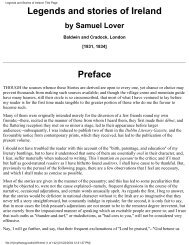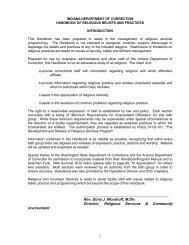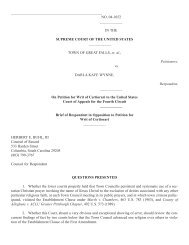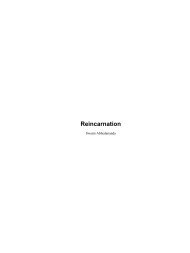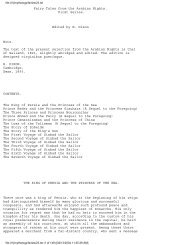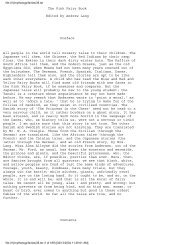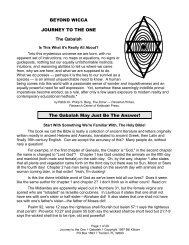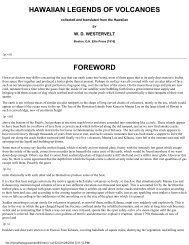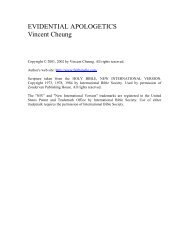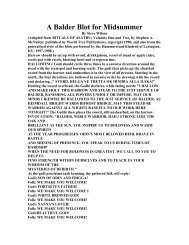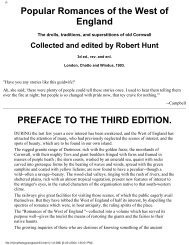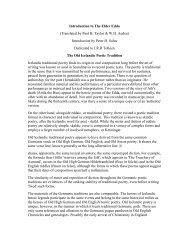Irish Druids And Old Irish Religions PREFACE CONTENTS
Irish Druids And Old Irish Religions PREFACE CONTENTS
Irish Druids And Old Irish Religions PREFACE CONTENTS
Create successful ePaper yourself
Turn your PDF publications into a flip-book with our unique Google optimized e-Paper software.
themselves maintained loftier conceptions. The early Christian missionaries seemed to have adopted a like policy in allowing their<br />
converts considerable liberty, especially if safe-guarded by a change of names in their images. For instance, as Fosbroke's British<br />
Monarchism says, "British churches, from policy, were founded upon the site of Druidical temples."<br />
The three rays of the <strong>Druids</strong>, three yods, fleur-de-lis, broad arrow, or otherwise named, may have represented light from heaven, or the<br />
male attributes, in the descending way, and female ones when in the reversed position. They may have been Buddhist, or even ancient<br />
Egyptian--and may have symbolized different sentiments at different times, or in different lands.<br />
As <strong>Druids</strong>, like other close bodies, wrote nothing, we depend upon outside pagans, and Christian teachers, for what we know of their<br />
doctrines. Doubtless, as many Spanish Jews kept secretly their old faith after the enforced adoption of Christianity, so may some <strong>Irish</strong><br />
monks have partly retained theirs, and even revealed it, under a guise, in their writings, since ecclesiastical authority shows that Druidism<br />
was not wholly extinct in the sixteenth century.<br />
While some authorities imagined the <strong>Druids</strong> preceded the ordinary polytheistic religion, others taught that they introduced pantheism.<br />
Amédée Thierry, in Histoire des Gaulois, found it based on pantheism, material, metaphysical, mysterious, sacerdotal, offering the most<br />
striking likeness to the religions of the East. He discovered no historic light as to how the Cymry acquired this religion, nor why it<br />
resembled the pantheism of the East, unless through their early sojourn on the borders of Asia.<br />
"The empire of Druidism," says he, "did not destroy the religion of exterior nature, which had preceded it. All learned and mysterious<br />
religions tolerate an under-current<br />
p. 70<br />
of gross fetishism to occupy and nourish the superstition of the multitude."<br />
Again he writes--"But in the east and south of Gaul, where Druidism had not been imposed at the point of the sword, although it had<br />
become the prevailing form of worship, the ancient religion preserved more independence, even under the ministry of the <strong>Druids</strong>, who<br />
made themselves its priests. It continued to be cultivated, if I may use the word, following the march of civilization and public<br />
intelligence, rose gradually from fetishism to religious conceptions more and more purified." Was it in this way that <strong>Druids</strong> found their<br />
way to Britain and Ireland?<br />
Cæsar, who saw nothing of the religion among these islands, was told that here was the high seat of Druidism. His observations on<br />
religion were not so keen as those on the art of war. Thierry regarded Druidism as an imported faith into Gaul, and partly by means of<br />
force. Strabo heard that <strong>Druids</strong> spoke Greek. Tacitus may say our rude ancestors worshipped Castor and Pollux; but Agricola, who<br />
destroyed <strong>Druids</strong> in Mona, found no images in the woods.<br />
Baecker remarked that "the Celtic history labours under such insuperable obscurity and incertitude, that we cannot premise anything above<br />
a small degree of verisimilitude." <strong>And</strong> Ireland's Mirror ventured to write--"On no subject has fancy roamed with more licentious<br />
indulgence than on that of the <strong>Druids</strong> and their Institutions. Though sunk in the grossest ignorance and barbarism, their admirers have<br />
found them, in the dark recesses of forests, secluded from mankind, and almost from day, cultivating the abstrusest sciences, and<br />
penetrating the sublimest mysteries of nature--and all this without the aid of letters or of experiments."<br />
This is not the opinion of some modern devotees of<br />
p. 71<br />
Druidism in these islands, who imagine, under Druidic control, the existence of a primal and exalted civilization.<br />
O'Curry thought it probable "that the European Druidical system was but the offspring of the Eastern augury, somewhat less complete<br />
when transplanted to a new soil."<br />
DRUIDICAL MYSTICISM.<br />
However orthodox the <strong>Irish</strong> of the present day may be esteemed, there must have been a fair amount of mysticism in the past amongst so<br />
imaginative a race. Perhaps this quality brought them into some disrepute with the Church, down to the time when the Pope gave their<br />
country to the Norman King of England, in order to bring the people into more consistent faith. Even St. Bernard, in his Life of Malachy,<br />
referred to the <strong>Irish</strong> as "Pagans, while calling themselves Christians."<br />
John Scotus Erigena, the learned <strong>Irish</strong>man of the ninth century, was certainly mystical in his views. He spoke of God as the essence of all<br />
things; of the Divine Dark and Supreme Nothing; of creation being only an eternal self-unfolding of the Divine Nature; of all things<br />
resolved or self-drawn to God; of time and space, of modes of conception of the present state, &c.<br />
Gould's History of Freemasonry refers to the connection between the <strong>Druids</strong> and Freemasons. The Papal Bull of 1751 against the latter<br />
might have been applied to the former:--<br />
file:///I|/mythology/witchcraft/8/8.html (26 of 114) [02/05/2004 8:38:14 AM]



